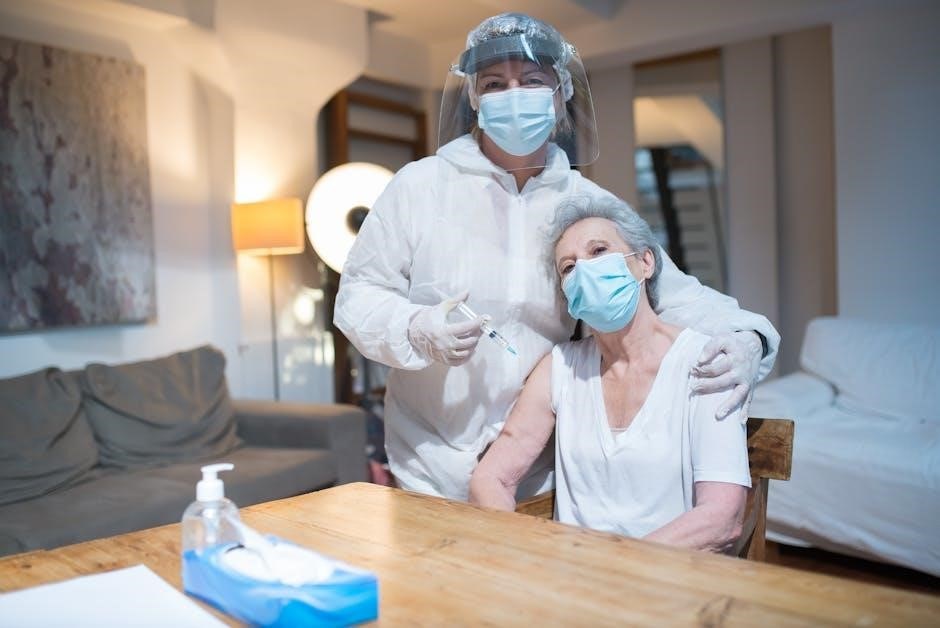Home health nursing involves providing medical care to patients in their homes, focusing on recovery, disease management, and improving quality of life. Nurses serve as health monitors, care providers, educators, and advocates, ensuring personalized support in a familiar environment. This field emphasizes compassion, professionalism, and adaptability, addressing diverse patient needs while fostering independence and well-being.
1.1 Definition and Scope of Home Health Nursing
Home health nursing involves providing medical care to patients in their homes, focusing on recovery, disease management, and improving quality of life. Nurses serve as health monitors, care providers, educators, and advocates, ensuring personalized support in a familiar environment. This field emphasizes compassion, professionalism, and adaptability, addressing diverse patient needs while fostering independence and well-being.
1.2 Importance of Home Health Nurses in Patient Care
Home health nurses play a vital role in patient care by providing skilled nursing services, managing chronic conditions, and preventing hospital readmissions. They monitor patients’ health, administer treatments, and educate families on care strategies. Their presence ensures continuous support, improving patient outcomes and enhancing quality of life. Home health nurses also address emotional and psychological needs, fostering a holistic approach to healthcare in the comfort of patients’ homes.
Primary Responsibilities of Home Health Nurses
Home health nurses provide direct patient care, conduct assessments, develop care plans, monitor progress, administer medications, and educate patients and families on health management and safety practices.
2.1 Direct Patient Care and Monitoring
Home health nurses deliver hands-on care, monitoring patients’ vital signs, managing symptoms, and assisting with daily activities. They administer medications, dress wounds, and provide therapeutic interventions tailored to individual needs. Nurses use clinical judgment to identify changes in condition, ensuring timely interventions. They also educate patients and families on self-care techniques, promoting independence and safety in the home environment. This direct care is essential for supporting recovery, preventing complications, and enhancing overall well-being.
2.2 Nursing Assessment, Planning, and Evaluation
Home health nurses conduct comprehensive assessments to identify patient needs, developing personalized care plans that outline goals and interventions. They implement evidence-based strategies, continuously monitoring progress and adjusting plans as needed. Regular evaluations ensure care aligns with patient outcomes, optimizing recovery and quality of life. This process involves collaboration with healthcare teams, ensuring coordinated and effective care delivery tailored to individual requirements and promoting the best possible patient results.
2.3 Administering Medications and Treatments
Home health nurses are responsible for administering medications and treatments as prescribed by physicians. They ensure medications are taken correctly, monitor for side effects, and educate patients on proper usage. Nurses also perform therapies, such as wound care or injections, and manage medical equipment. Accurate documentation of medication administration and treatment outcomes is essential to maintain continuity of care and patient safety in the home setting.
Supporting Responsibilities
Home health nurses provide essential support through patient education, documentation, and infection control. They collaborate with healthcare teams to ensure comprehensive care, addressing patient and family needs effectively.

3.1 Patient and Family Education
Home health nurses empower patients and families through education on disease management, medication, and self-care. They provide personalized guidance, addressing nutritional needs, safety measures, and treatment plans. This education fosters independence, enhances health literacy, and improves adherence to care routines, ensuring patients and caregivers are equipped to manage daily health challenges effectively.
3.2 Documentation and Record-Keeping
Accurate and timely documentation is crucial in home health nursing to ensure continuity of care and legal compliance. Nurses maintain detailed records of patient visits, treatments, and progress, using tools like Electronic Health Records (EHRs). This documentation includes care plans, medication administration, and patient responses to treatment. Proper record-keeping facilitates clear communication among healthcare providers, supports reimbursement processes, and ensures accountability. It also helps track patient outcomes and informs future care decisions effectively.
3.3 Infection Control and Safety Measures

Home health nurses prioritize infection control to prevent disease transmission and ensure patient safety. They use personal protective equipment (PPE), maintain proper hand hygiene, and sterilize equipment. Nurses assess the home environment for safety hazards, educate patients and families on infection prevention, and implement protocols to minimize risks. These measures protect both patients and healthcare providers, promoting a safe care delivery environment in the home setting.

Supervision and Coordination
Home health nurses supervise aides, ensuring quality care delivery, and coordinate with healthcare providers to develop comprehensive care plans, optimizing patient outcomes and resource allocation effectively.
4.1 Supervising Home Health Aides
Home health nurses are responsible for supervising home health aides, ensuring they provide high-quality, patient-centered care. This includes training, monitoring tasks, and evaluating performance to maintain care standards. Nurses delegate responsibilities such as bathing, dressing, and feeding patients, while also addressing any concerns or issues that arise during care delivery. Effective supervision ensures that aides work efficiently and compassionately, supporting overall patient well-being and safety.
4.2 Coordinating with Other Healthcare Providers
Home health nurses collaborate with physicians, therapists, and other healthcare professionals to ensure comprehensive patient care. They communicate patient progress, develop coordinated care plans, and share updates to align treatments. This coordination ensures continuity of care, addresses patient needs holistically, and promotes better health outcomes. Effective communication and teamwork are essential in managing transitions between care settings and optimizing patient well-being.

Specialized Care and Services
Home health nurses provide specialized care, including geriatric nursing, wound management, and palliative care. These services address specific patient needs, ensuring tailored support and expertise.
5.1 Geriatric Nursing Care
Geriatric nursing care focuses on elderly patients, addressing chronic conditions, mobility issues, and cognitive decline. Nurses provide personalized support, managing medications, offering physical therapy, and promoting mental well-being. They ensure safety, prevent falls, and maintain independence, collaborating with families to create care plans that enhance quality of life and dignity for aging patients in their homes.
5.2 Wound Care and Management
Home health nurses specialize in wound care, assessing and treating acute, chronic, and complex wounds. They clean, dress, and monitor wounds to promote healing, prevent infection, and minimize scarring. Nurses also educate patients and caregivers on proper wound management, nutrition, and lifestyle adjustments to support recovery. Regular evaluations and adjustments to treatment plans ensure optimal outcomes and improve patient comfort.
5.3 Palliative and End-of-Life Care

Home health nurses provide compassionate palliative and end-of-life care, focusing on pain management, symptom relief, and emotional support. They ensure patients’ comfort and dignity in their homes, addressing physical, emotional, and spiritual needs. Nurses collaborate with families to create personalized care plans, offering guidance on advanced care directives and bereavement support. This holistic approach prioritizes quality of life, helping patients and families navigate the end-of-life journey with grace and peace.

Professional Development and Ethics
Home health nurses must commit to ongoing education, adhering to ethical and legal standards. They prioritize patient confidentiality, respect autonomy, and uphold professional integrity in all interactions.
6.1 Continuing Education and Training
Continuing education is vital for home health nurses to stay updated on best practices and technologies. They engage in workshops, certifications, and online courses to enhance skills, ensuring high-quality patient care. Training covers advanced medical techniques, disease management, and legal updates, fostering professional growth and adaptability in a dynamic healthcare environment. This commitment ensures they remain competent and effective in their roles.
6.2 Adhering to Ethical and Legal Standards
Home health nurses must uphold ethical principles, ensuring patient confidentiality, autonomy, and dignity. They adhere to legal standards, following care plans and healthcare laws. This includes accurately documenting patient care and maintaining professional boundaries. Ethical decision-making guides their practice, ensuring compassionate and respectful care delivery.
Legal compliance involves understanding patient rights, privacy laws, and reporting requirements. Nurses are accountable for providing care that aligns with ethical guidelines and organizational policies, fostering trust and integrity in their practice.

Family and Caregiver Support
Home health nurses support patients and families by providing education, guidance, and emotional assistance to caregivers, fostering a collaborative care environment and enhancing overall well-being.
7.1 Building Relationships with Family Members
Building strong relationships with family members is crucial for effective home health care. Nurses foster trust and communication by actively listening to concerns, providing emotional support, and involving families in care decisions. This collaboration ensures a patient-centered approach, enhancing mutual understanding and cooperation. By addressing both practical and emotional needs, nurses strengthen family dynamics and promote a supportive care environment, ultimately benefiting patient outcomes and overall well-being.
7.2 Providing Emotional and Psychological Support
Home health nurses play a vital role in offering emotional and psychological support to patients and their families. They provide empathetic listening, reassurance, and coping strategies to address stress, anxiety, and grief. By fostering a supportive environment, nurses help patients maintain mental well-being and adapt to their health conditions. This compassionate care enhances overall quality of life and strengthens resilience, enabling patients to manage challenges effectively while preserving their independence and dignity.
Technology and Tools in Home Health Care
Home health care utilizes technology like EHRs for documentation and telehealth platforms for remote monitoring, enhancing care coordination and improving patient outcomes through efficient management of medical equipment and supplies.
8.1 Use of Electronic Health Records (EHRs)
Electronic Health Records (EHRs) are essential tools in home health care, enabling nurses to access and manage patient data efficiently. EHRs streamline documentation, ensuring accurate and up-to-date records. They facilitate secure sharing of patient information among healthcare providers, improving care coordination. By automating tasks like medication lists and treatment plans, EHRs reduce errors and save time. Additionally, they support compliance with legal and regulatory standards, enhancing overall patient care quality and safety.
8.2 Medical Equipment and Supply Management
Home health nurses are responsible for managing medical equipment and supplies, ensuring they are in proper working condition and hygienic. This includes monitoring inventory, ordering necessary supplies, and maintaining equipment for patient use. They also educate patients and caregivers on the safe use of medical devices. Proper management of resources ensures effective care delivery, prevents infections, and optimizes patient outcomes. Accurate documentation of equipment use and supply levels is also essential for continuity of care.
Challenges and Opportunities
Home health nurses face challenges like infection control and managing complex patient needs. Opportunities include leveraging technology for remote monitoring and advancing professional skills in specialized care.
9.1 Challenges Faced by Home Health Nurses
Home health nurses encounter challenges such as managing infection control in diverse home environments, handling complex patient conditions, and coordinating care with other healthcare providers. Time management and heavy workloads are also significant, as they often travel between patients. Additionally, ensuring patient adherence to treatment plans and navigating limited resources can complicate care delivery. These challenges require strong organizational and interpersonal skills to maintain high-quality patient outcomes.
9.2 Opportunities for Advancement and Innovation
Home health nursing offers opportunities for professional growth through specialized certifications and leadership roles. Technological advancements, such as telehealth and AI, enhance care delivery and patient monitoring. Nurses can innovate by developing personalized care plans and integrating new medical equipment. Expanding into niche areas like geriatric or palliative care further diversifies their expertise; Continuous education and training enable nurses to stay updated on best practices, fostering advancements in patient outcomes and career development.
Home health nursing plays a vital role in patient care, offering personalized support and improving quality of life. Nurses adapt to diverse needs, ensuring compassionate and skilled assistance, making a significant difference in recovery and well-being.
10.1 Summary of Home Health Nurse Responsibilities
Home health nurses provide direct patient care, including assessments, medication administration, and wound management. They educate patients and families, maintain detailed records, and coordinate with healthcare teams. Responsibilities also include infection control, supervising aides, and ensuring safety protocols. Nurses adapt care plans to meet individual needs, focusing on recovery, disease management, and quality of life. Their role is crucial in delivering personalized, compassionate care in home settings, addressing physical, emotional, and psychological needs effectively.
10.2 The Future of Home Health Nursing
The future of home health nursing is poised for growth, driven by technological advancements and increasing demand for personalized care. Telehealth integration will enhance remote monitoring and patient accessibility. Nurses will need advanced skills in technology and data management. Expanding roles may include preventive care and chronic disease management. The focus will remain on delivering high-quality, patient-centered care, ensuring better health outcomes and improved quality of life for patients in the comfort of their homes.